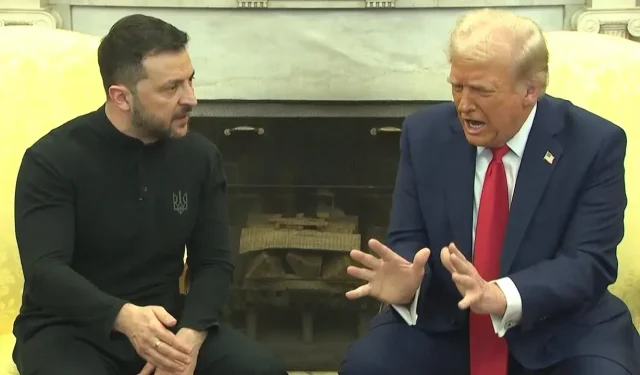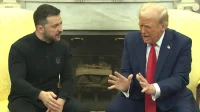The recent meeting between U.S. President Donald Trump and Ukraine President Volodymyr Zelenskyy has captured significant media attention, particularly due to a heated exchange regarding Ukraine’s ongoing conflict with Russia. In this article, we will delve into the key moments of their confrontation in the Oval Office, examining the implications of their statements and the broader context surrounding their dialogue. This analysis is essential for understanding the geopolitical dynamics at play and the ongoing challenges faced by Ukraine.
The Context of the Discussion
The meeting took place amid escalating tensions in Eastern Europe, with Zelenskyy expressing his concerns over comments made by Trump and Vice President JD Vance regarding U.S. support for Ukraine. This context is crucial as it sets the stage for understanding the stakes involved in their discussion. Zelenskyy’s leadership has been instrumental in rallying international support for Ukraine, and any remarks that undermine this effort can have serious repercussions for the nation’s sovereignty and security.
As both leaders addressed the cameras, it became apparent that Zelenskyy was not merely a passive participant; he proactively challenged Trump’s assertions. This confrontational approach highlights Zelenskyy’s commitment to advocating for his country on the international stage, showcasing his determination to secure necessary support from the U.S. amidst a challenging political landscape.
Zelenskyy’s Challenge to U.S. Leadership
During the Oval Office meeting, Zelenskyy took the opportunity to directly address the comments made by Trump and Vice President Vance, which criticized U.S. military support for Ukraine. By challenging these remarks, Zelenskyy underscored the urgency of Ukraine’s needs for continued assistance in the face of the ongoing Russian invasion. This direct confrontation demonstrates Zelenskyy’s strategic approach to diplomacy, leveraging high-stakes interactions to emphasize the critical nature of Ukraine’s plight.
The implications of Zelenskyy’s challenge are significant; they not only highlight the fragility of U.S.-Ukraine relations but also bring attention to the global community’s responsibility to respond to aggression. As Russia continues to advance its military actions, Zelenskyy’s assertions serve as a call to action for both U.S. leadership and international allies, emphasizing the importance of unity in the face of conflict.
The Role of Domestic Politics in Foreign Policy
The exchange between Trump and Zelenskyy occurred within a complicated domestic political environment in the U.S., where foreign policy decisions are often influenced by internal party dynamics and public opinion. Trump’s prior comments and the reactions they elicited reflect the polarized nature of American politics, which can sometimes destabilize international commitments. Zelenskyy’s insistence on the importance of U.S. support illustrates how foreign leaders navigate these political landscapes to seek aid for their nations.
This context raises important questions about how domestic politics influence international relations and aid decisions. As Zelenskyy sought to firmly position Ukraine’s needs within the U.S. political discourse, it beckons a broader discussion about the role of leadership in shaping global alliances—an essential conversation as we move into an era where international cooperation may become more crucial than ever.
Conclusions: A Geopolitical Flashpoint
The confrontation between Donald Trump and Volodymyr Zelenskyy reflects a pivotal moment in both U.S. foreign policy and the ongoing conflict in Ukraine. As Zelenskyy voiced his country’s needs in a direct challenge to U.S. leadership, it reinforced the gravity of the situation faced by his nation. The implications of their exchange are vast, providing insights into the intricate interplay between domestic politics and international diplomacy.
As this geopolitical situation continues to evolve, one must consider: What are the potential consequences if U.S. support for Ukraine wavers, and how might this affect the broader geopolitical landscape in the face of Russian aggression? The dialogue initiated in the Oval Office underscores the importance of vigilance and solidarity in global politics, urging us to engage in further discussion about the ramifications of such high-stakes interactions.
https://www.youtube.com/watch?v=pq8-SFIl-rA


